Who has how much dysgenics?
The worldwide picture
In 2024, Seb Jensen published a report over at Hanania's CSPI (Are We Getting Dumber?) summarizing his findings concerning the speed of global dysgenics. Due to various reasons, the formal study was only published now:
Jensen, S., Pesta, B., & Kirkegaard, E. O. W. (2025). International meta-analysis of differential fertility for intelligence. OpenPsych. https://doi.org/10.26775/op.2025.08.06
Research on the relationship between fertility and intelligence, while extensive, is mostly limited to the United States.The existence and magnitude of differential fertility could vary depending on the region and the country; however, this area of research has not been explored. To overcome this limitation, the magnitude of the selection differential for intelligence in 65 different countries was calculated by consulting the literature and analyzing international datasets (n = 419,444, k = 156), as well as the magnitude of the correlation between fertility and educational attainment (n = 797,455, k = 454). Based on the results of the meta-analysis, the average country’s IQ is declining by 0.35 points per decade. Region comparisons suggest that the relationship between the number of children and intelligence is strongest in Latin America, Iran, and Turkey. In Denmark, Iceland, Estonia, Finland, and Switzerland, intelligence and fertility are negligibly related. However, there were some concerns with the quality of the international data which put the latter finding in question. The magnitude of the decline in IQ globally is about 1.1 point per decade between the years of 2023 and 2100, though the rate at which intelligence is declining is falling. When weighted by population, the magnitude of the decline within countries is 0.4 points per decade, so 36% of the global decline in IQ is within countries. National IQ and the selection differential for IQ correlates at 0.51, while socioeconomic development and the selection differential for IQ correlates at 0.48.
Most of the credit for this work was due to Seb, whereas the idea was mine I think, and Bryan helped with the write-up.
Ever since ancient times, it has been recognized that one can selectively breed animals, and Plato also realized that one could probably do this with humans to produce a kind of elite upper class. In fact, Plato was surprisingly accurate in his take on the genetics of success in his myths of the metals analogy:
[Y]et God in fashioning those of you who are fitted to hold rule mingled gold in their generation, for which reason they are the most precious — but in the helpers silver, and iron and brass in the farmers and other craftsmen. (...) and if sons are born to them with an infusion of brass or iron they shall by no means give way to pity in their treatment of them, but shall assign to each the status due to his nature and thrust them out among the artisans or the farmers. And again, if from these there is born a son with unexpected gold or silver in his composition they shall honor such and bid them go up higher, some to the office of guardian, some to the assistanceship, alleging that there is an oracle that the state shall then be overthrown when the man of iron or brass is its guardian.
In modern terms, Plato is claiming that like begets like, gold class parents tend to get gold class children, and the same for the other metals. However, he also recognizes that sometimes they don't, and when they do, the quality of the child should be honored (that is, they move up or down the social hierarchy). This is basically a description of hereditary meritocracy including the within-class variation component. Plato does not seem to have realized regression towards the mean (children of gold parents would tend to be of silver quality assuming a well-mixed population).
Ancient hot takes aside, in the study we looked at worldwide variation in intelligence dysgenics, the negative correlation between fertility and intelligence. It has long been realized that the upper classes were failing to reproduce their numbers starting sometime in the mid 1800s for England. Gregory Clark wrote a history book speculating that the rise of northern Europe (UK in his case) was due to the evolution of higher intelligence and other civic mentality traits throughout the middle ages and possibly before that (A Farewell to Alms: A Brief Economic History of the World, 2007). It should be stressed that while national levels of intelligence are highly stable across a few decades, over 100s of years, they can move quite a bit due to evolution (and especially migration). There is no guarantee that evolution is acting with the same strength or even in the same direction across time and place. As such, the world map of IQs might have looked quite a bit different 1000, 2000 or 5000 years ago than it does now. Ancient genomes will eventually deliver us 'national' IQs of ancient polities, and reveal what changes they might have gone through. So far, the only one we have studied in depth is the Roman empire, where it seems like there was a golden period of intelligence in ancient times, followed by a decline into the Empire times and dark ages. This fits somewhat with the historical changes in the polity. I know everybody is excited waiting for the Ancient Greek version of this (to test Galton's hypothesis), but so far not enough data have been forthcoming (given how fragmented Ancient Greece was, it is necessary to obtain 100s of genomes from the same location from different times). The reason I go into some depth about this is that one will often see criticism of national IQs as being impossible because X 100s years ago, this or that polity was the most developed place on earth while current world leaders were not doing anything of note (Scandinavian iron age vs. Roman Empire, or European Iron-Bronze age vs. Egyptian empire [Stonehenge vs. Pyramids]). In my review of climate theories, I also pointed out that due to climatic factors, it is much easier to get started with civilization building in places where crops grow more readily, so we don't really expect civilization to first develop in the areas with the highest average genetic intelligence peoples, except if these live in places that are relatively easy to develop.
Moving back to the new study. We aggregated data from worldwide studies of cognitive ability broadly speaking (PISA, PIAAC, PIRLS), plus large national studies when available (e.g. NLSYs and GSS for USA). Using these datasets to construct maps of dysgenic speed requires assumptions. For instance, PISA data only concerns adolescents, and their number of siblings. Their number of siblings + 1 is their parents' fertility at the time (beware that childless adults are not included this way). One thus further has to divide by the correlation between child-parent IQs to estimate the parental fertility-intelligence correlation. Other samples had adults but not all of them were done having children, so age adjustments are needed. Overall, this is not a perfect set of estimates, but they should be accurate enough to get broad patterns in dysgenics across the world. Using an equation to convert the fertility correlation into decadal change, one can construct this list:
And this map:
Note that this map includes imputations based on education-fertility patterns (there is a map in the paper with the unimputed values only). Nevertheless, we see some patterns in regions:
It appears that the Matthew's principle applies here, sort of: the rich get poorer in intelligence, but more slowly than the poor:
Using instead a national socioeconomic composite (S factor) produces about the same correlation. Given that there are only ~65 countries with data (with their uncertainties), extensive modeling of highly correlated predictors is not of much use here.
It is not so obvious that culture has a lot to do with the speed of decline. We see for instance that Muslim countries have a relatively fast decline, but so does Latin American Catholic countries, while the smallest declines are seen in the relatively atheistic Northern European countries. This is roughly the opposite of what one might expect based on our work using data from individuals, where religiousness seems to protect against dysgenics. Clearly, more research is needed.
Anyway, if one assumes these decline speeds (selection differentials), one can forecast the world's mean IQ, taking also into account the fertility rates:
This produces roughly the same line go down figure as just using the national IQs and fertility rates by themselves. This is because most of the decline has to do with between country effects:
Within countries, IQ is declining at a rate of 0.4 points per decade when population size weights are used. This
means that about 36% of the global decline is due to decline within countries and the remaining variance is due
to decline between countries
There is more in the study to dig into, but you will have to explore it for yourself.
To forestall criticism, here's a list of limitations:
The PISA data requires using number of siblings conversion to parental fertility correlations, which rests on various assumptions.
Some of the other datasets require age modeling to adjust for incomplete fertility, which again rests on assumptions.
Many countries just have no IQ and fertility data at all, in which case they are estimated based on education and fertility data (if such even exists).
The usual assumptions regarding between country and over time measurement invariance in order to produce world IQ maps.
It was assumed that additive heritability was constant across time and place (60%), which is maybe not true either.
Country-level forecasts were based on current data, and not making any assumptions about future migration, which is impossible to forecast accurately (50 years ago, would you have forecast that millions of Indians would move to Canada?).


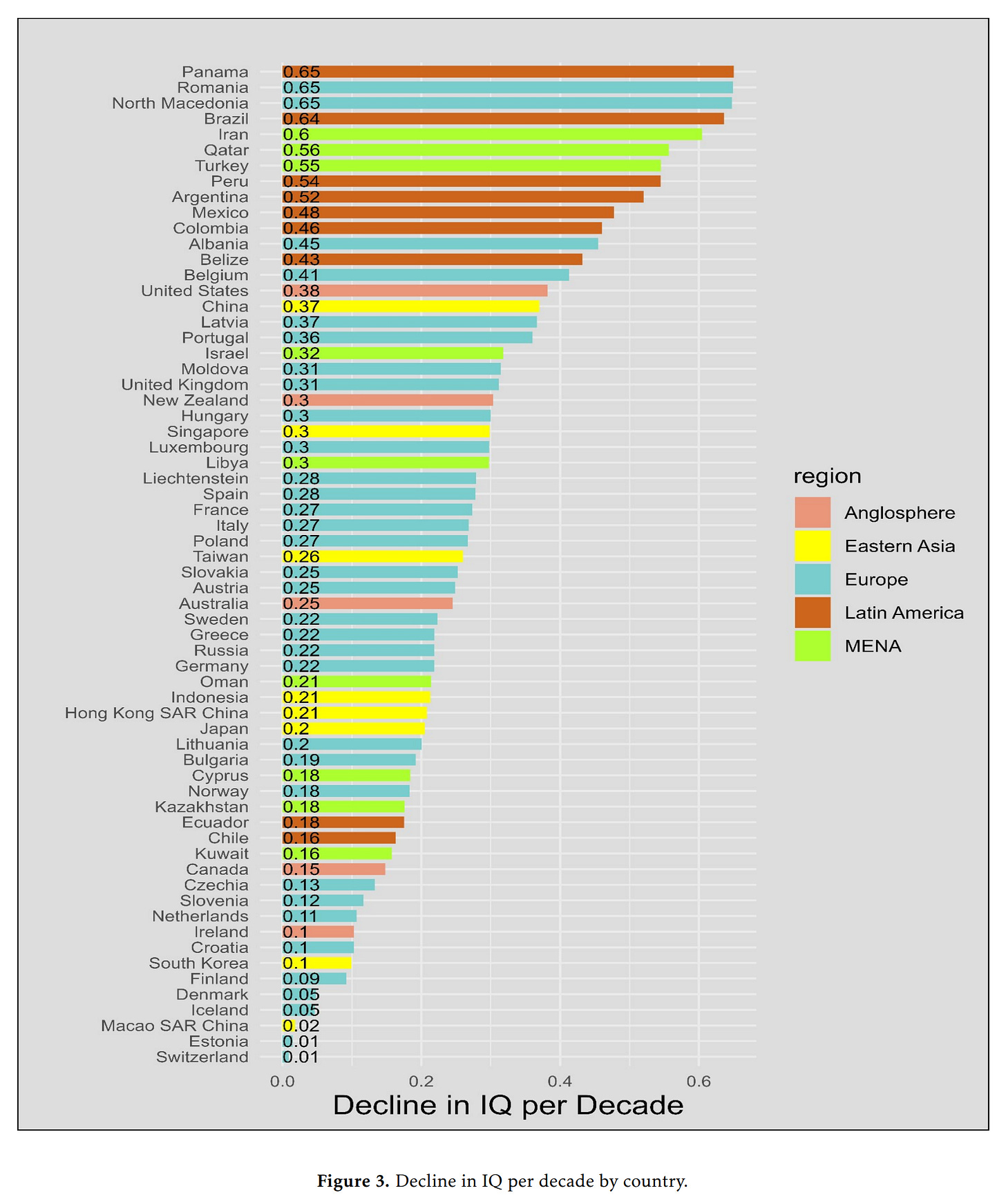
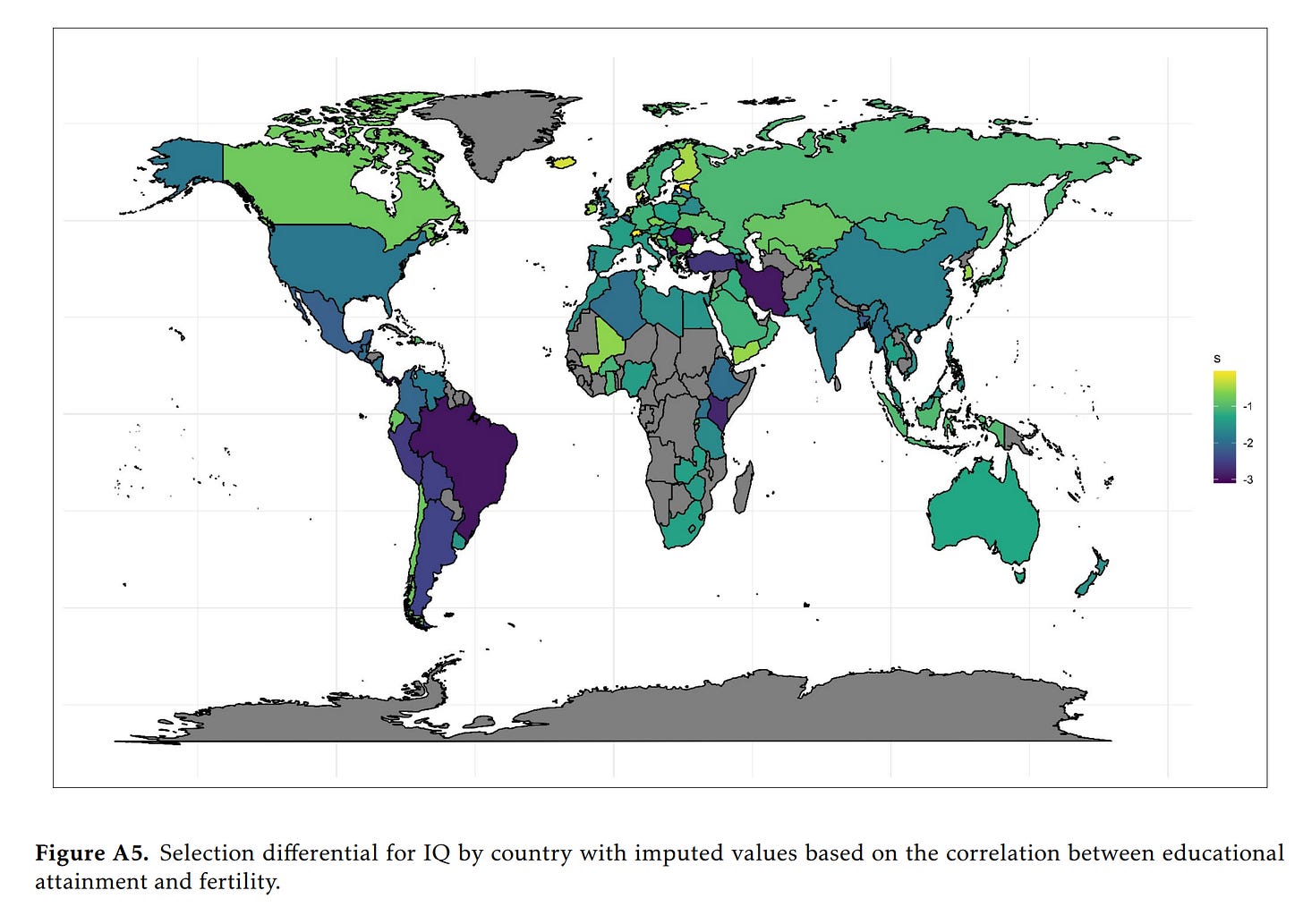
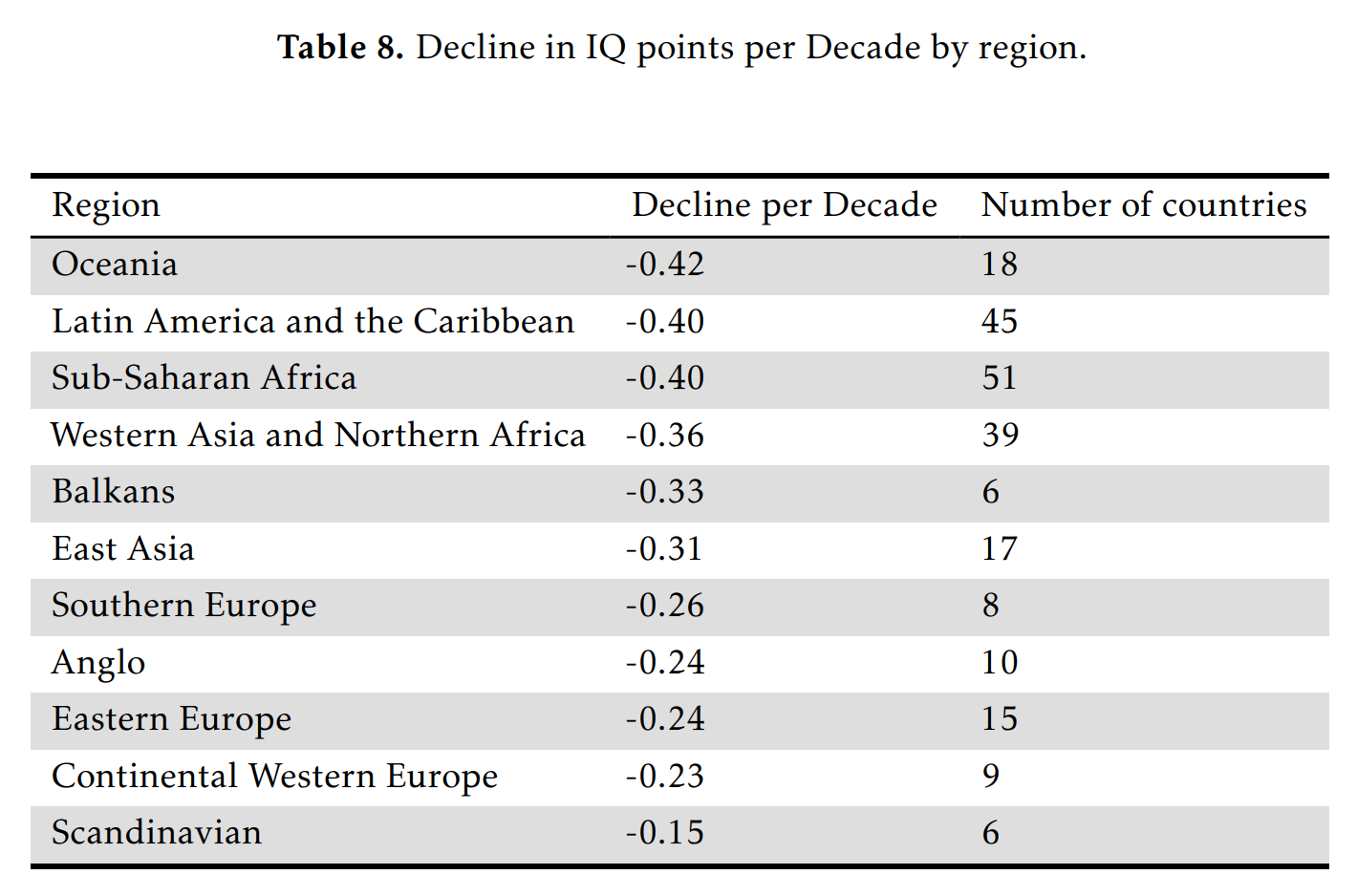
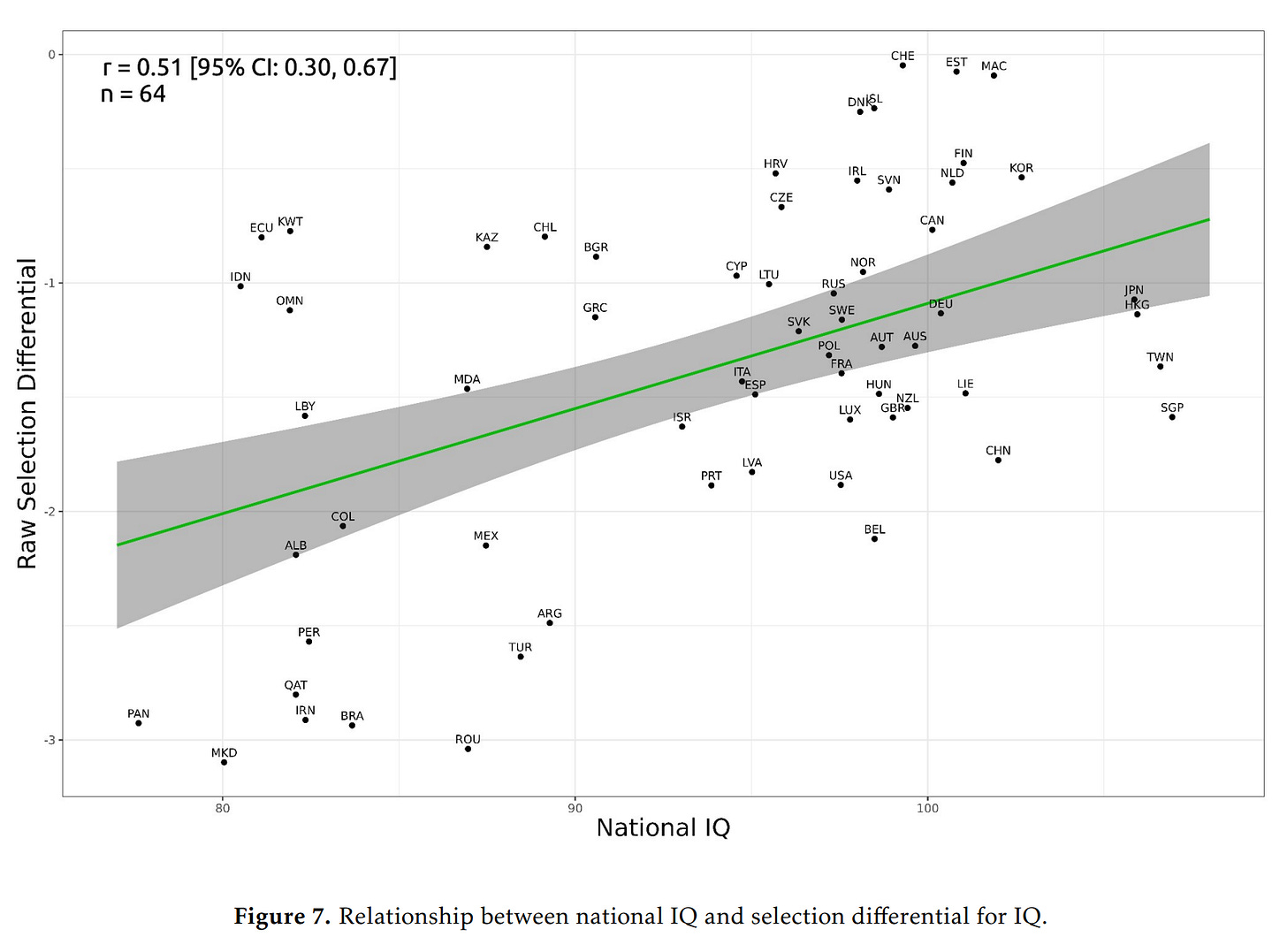
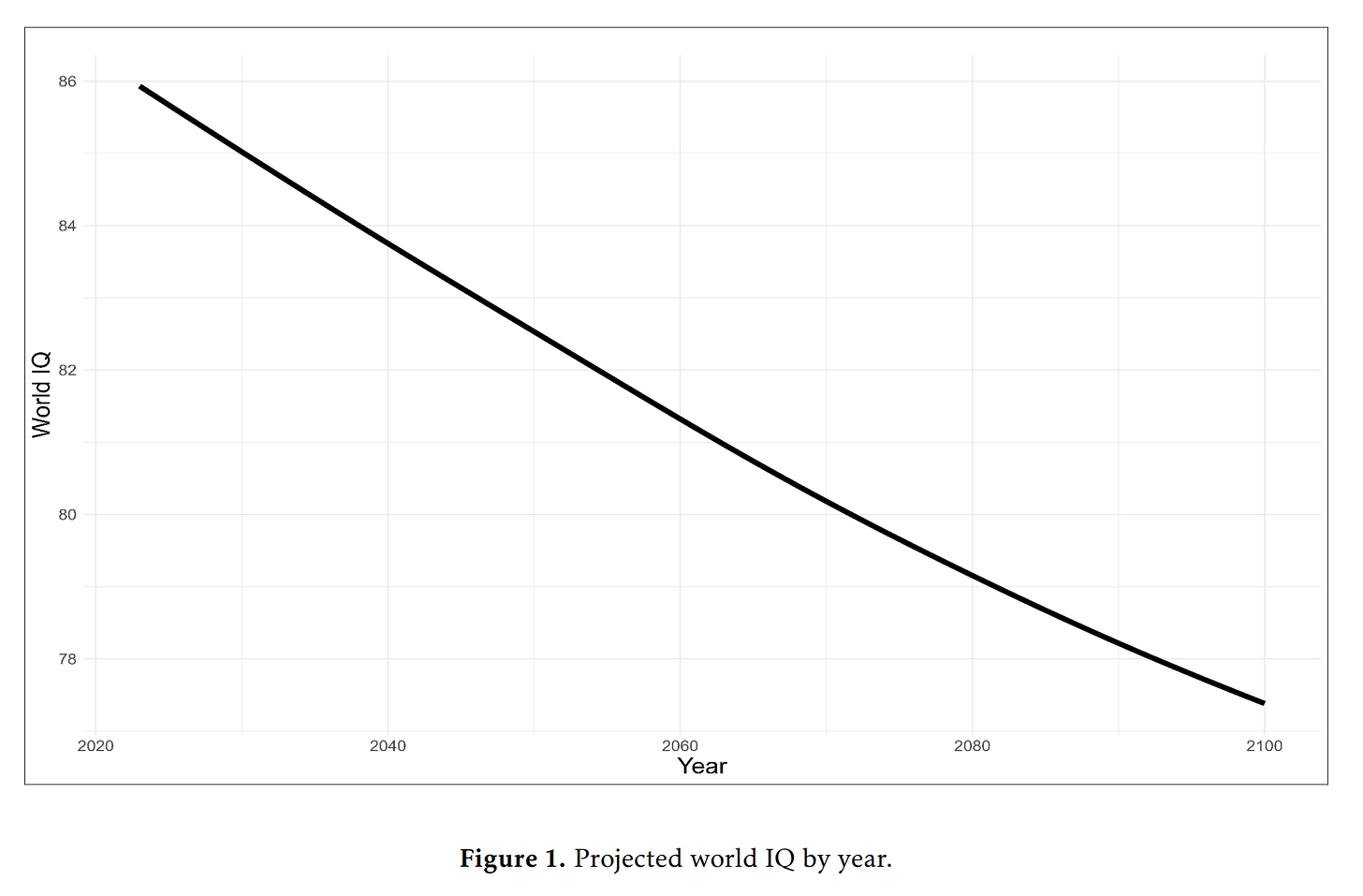
In a difficult world, nature selects for intelligence. In an easy world, nature selects for wanton reproduction. In a world with birth control and abortion, nature selects for intentional reproduction combined with low time preference. We’re only a few generations into the new natural selection regime, and populations are slowly crashing while we wait to figure out who “the fittest” are.
Emil (or anyone else with an opinion), what country or countries in the world do you feel the most optimistic about the long-term trajectory of?